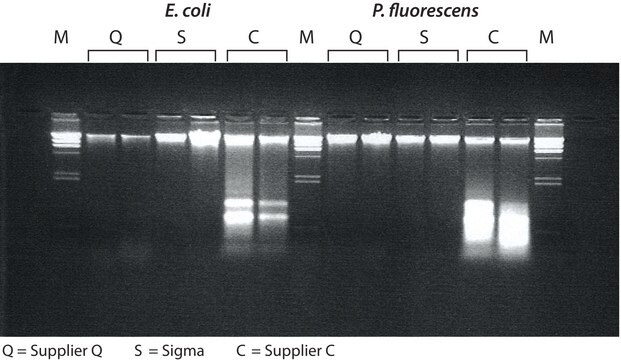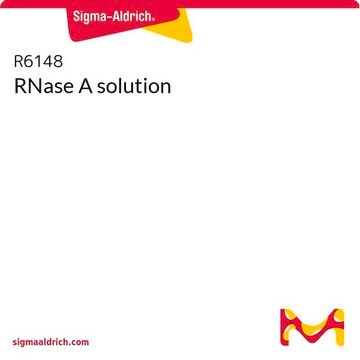G1N10
GenElute™ Mammalian Genomic DNA Miniprep Kits
sufficient for 10 purifications
Synonym(s):
Mammalian Genomic DNA Miniprep, Gen Elute
About This Item
Recommended Products
Looking for similar products? Visit Product Comparison Guide
General description
Isolate pure genomic DNA from cultured cells, tissues (including rodent tails), and fresh whole blood or white blood cells. The kit combines the advantages of silica binding with a microspin format and eliminates the need for expensive resins, alcohol precipitation, and hazardous organic compounds such as phenol and chloroform.
Application
- restriction endonuclease digestions
- PCR
- Southern blots
- sequencing reactions
- cloning
- ligation
Features and Benefits
- Expected yield: 25 μg from 2 x 106 cultured cells; 30 μg from 25 mg of tissue
- Elution volume: 200 - 400 μl
- Time required: 20 min after lysis
- A260/A280 ratio: 1.6 - 1.9
- Mechanical homogenization required: No
Principle
Other Notes
Legal Information
recommended
related product
Signal Word
Danger
Hazard Statements
Precautionary Statements
Hazard Classifications
Acute Tox. 4 Oral - Aquatic Acute 1 - Aquatic Chronic 2 - Eye Dam. 1 - Met. Corr. 1 - Resp. Sens. 1 - Skin Irrit. 2 - STOT SE 3
Target Organs
Respiratory system
Storage Class Code
8A - Combustible corrosive hazardous materials
Flash Point(F)
483.8 °F
Flash Point(C)
251 °C
Certificates of Analysis (COA)
Search for Certificates of Analysis (COA) by entering the products Lot/Batch Number. Lot and Batch Numbers can be found on a product’s label following the words ‘Lot’ or ‘Batch’.
Already Own This Product?
Find documentation for the products that you have recently purchased in the Document Library.
Customers Also Viewed
Articles
Simple DNA/RNA purification methods aid genome analysis from various sources, enhancing research efficiency.
Protocols
Archived Formalin-fixed, Paraffin-embedded (FFPE) tissue samples are invaluable resources for profiling gene expression and studying a variety of diseases.
GenomePlex® Whole Genome Amplification efficiently extracts DNA from animal samples for genomic analysis.
This protocol provides a simple and convenient method to isolate, amplify, and purify genomic DNA from buccal swabs. Buccal swabs are a convenient method of acquiring a DNA sample.
The GenElute Mammalian Genomic DNA Purification Kit Protocol describes the isolation of pure, high molecular weight DNA from a variety of mammalian sources.
Related Content
GenElute Mammalian Genomic DNA Purification Kit isolates pure DNA from mammalian cells using a silica-based membrane in spin columns.
Our team of scientists has experience in all areas of research including Life Science, Material Science, Chemical Synthesis, Chromatography, Analytical and many others.
Contact Technical Service












